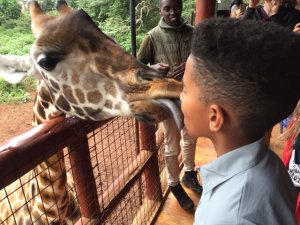More Than Just Eyes and Ears
Experiential learning is powerful, and you can create ways for students to learn with all their senses—in and out of the classroom.
Your content has been saved!
Go to My Saved Content.We’ve just spent the afternoon visiting a Maasai village in Tanzania, and over dinner my 12-year-old son catalogues his learning for the day. He tells me that he now knows what the vines on the Maasai’s sacred trees feel like because he got to swing on one. He learned that traditional Maasai soups are “much better tasting than I imagined they’d be.” He watched the village knife maker in action and learned about how the Maasai make their sandals from old tires. He learned that Maasai bomas (traditional round houses) are dark and cool—because he was in one. He learned what it smells like in the cattle corrals and in the smoky kitchen where the women cook.
He also learned that Maasai singing sounds totally different from anything else he’s ever heard: “I want to know what key they’re singing in,” he says. “I never knew!” he repeats over and over.
Learning Through Our Senses
I’m struck by how much of my son’s learning is sensory. And then I’m reminded that for me, the experience of traveling and the way I learn about another culture is so often primarily through my eyes, my ears, and my taste buds. I am tremendously fortunate to be able to travel and to be able to take my son around the world.

Learning through our senses helps us remember, and helps us connect to others. Even when we don’t speak the same language, an infectious drumbeat gets everyone moving. A sweet treat makes our eyes widen in delight. Getting caught in an afternoon downpour in the tropics is a mixed blessing. There are many ways to connect with others, and our senses offer portals. This is true whether we’re in distant lands or in our own community trying to build connections between students in our own classroom.
Taking Kids Out of the Classroom to Learn
Field trips still matter. Field trips make a curriculum come to life. They are the experiences that kids remember decades later, and they can spark curiosity and learning in a way that is unrivaled by what goes on in the classroom. In this era of standardized testing and reduced decision-making for teachers, field trips seem to be an endangered experience. But perhaps we’ve just forgotten how rich and meaningful the learning can be when it’s experienced outside of the classroom.
Field trips can be close, easy, and short. A field trip to a local park with a new purpose (to draw spring plants, to interview people, or to count migratory birds) can be a wonderful learning experience. A field trip to a local fire station or restaurant or health care center can spark curiosity and offer kids an opportunity to practice skills that they’re working on in class. It doesn’t have to be complicated, although complicated field trips are really rewarding. And a reminder for parents: Local trips with a new purpose or lens can be wonderful, as well as big trips into unknown territories.
Bringing the World Into the Classroom
If you can’t take your kids out into the world as much as you’d like, you can think about how to bring the world into the classroom. Think about the senses: How can you help kids experience a unit of study through sound, smell, and touch? We can always find ways. And think about how these ways of experiencing the world can help students connect with each other. How can they talk about and share their experience of trying a new food or of listening to a piece of music? The learning will then occur on multiple levels—learning about the world, about themselves, and about each other.
Experiential learning isn’t complicated. It’s just about remembering what we all know—there are many ways that our minds take in information. Think about your own life and experiences. Recall field trips from when you were a kid.
Reflect on how you’ve learned the most in your life. I’ll bet that your fondest memories involve multiple senses. And now think about how you might make just one aspect, one slice of your curriculum come to life through the senses next week. I’m sure the lesson will also be more enjoyable and memorable for you, too.
